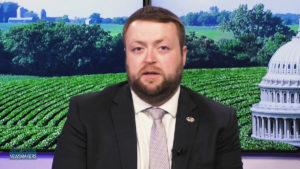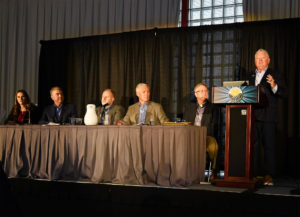Agri-Pulse Welcomes Rebekah Alvey
 Agri-Pulse is pleased to welcome Rebekah Alvey as an associate editor.
Agri-Pulse is pleased to welcome Rebekah Alvey as an associate editor.
Alvey, who has experience covering energy and environment issues and Capitol Hill, comes to Agri-Pulse from Politico’s E&E News, where she reported on a broad swath of issues including electric vehicles and endangered species regulation, and she helped cover the House speaker race in October 2023. She earlier learned her way around Capitol Hill while with the Washington bureau of the Dallas Morning News, where she covered the Texas congressional delegation.
“We are thrilled to have Rebekah join our team and will be able to hit the ground running,” said Editor Sara Wyant. “We look forward to having her apply her data journalism skills to the complex agriculture, renewable energy, environment and food topics we cover.”
Alvey earned degrees in journalism and Arabic from Western Kentucky University, while handling multiple leadership roles at the student newspaper, the College Heights Herald. During her undergraduate studies, she spent a semester abroad at the Danish School of Media and Journalism, where she developed an interest in data journalism and political reporting. She later participated in the Politico Journalism Institute and eventually got a masters in journalism from American University.
Industry Ag News 3/29
Planted acreage intentions for corn are down or unchanged in 38 of the 48 estimating states. Soybean growers intend to plant 86.5 million acres in 2024, up 3% from last year.
Syngenta Anticipates Good Summer for Storen™
 Growers first heard about Syngenta’s latest residual corn herbicide Storen™ at last year’s Commodity Classic and this year Syngenta was pleased to say it is ready for use after approval in July 2023.
Growers first heard about Syngenta’s latest residual corn herbicide Storen™ at last year’s Commodity Classic and this year Syngenta was pleased to say it is ready for use after approval in July 2023.
“We’re in the process of working with our channel partners and the first growers that are going to use Storen corn herbicide this summer,” said Shawn Hock, Syngenta Corn Herbicide Product Lead. “We actually launched a Storen satisfaction program this year and we’re asking growers that use it to provide their experience.”
Storen is labeled for pre-emergence and post-emergence in field corn and seed corn for more than 74 weed species, including Palmer amaranth, waterhemp, kochia, common lambsquarters, morningglory, Giant ragweed, common ragweed, and annual grasses.
Learn more in this interview with Hock from Classic24
Classic24 Shawn Hock, Syngenta corn herbicides 3:19
MyLand Announces Water Saving Data for World Water Day
 Soil health company MyLand celebrated World Water Day this year by releasing new data on water conservation benefits achieved through its Soil as a Service (SaaS) offering, demonstrating MyLand’s impact on water conservation in Arizona and California.
Soil health company MyLand celebrated World Water Day this year by releasing new data on water conservation benefits achieved through its Soil as a Service (SaaS) offering, demonstrating MyLand’s impact on water conservation in Arizona and California.
MyLand partners with growers to improve soil health and soil function by harnessing the land’s native organics, resulting in profound impacts on water conservation. Increased water holding capacity and soil organic matter represent two fundamental soil health indicators of water conservation. Healthy soil can hold onto more water for longer periods, reducing the need for frequent irrigation and lowering overall water usage. On average, MyLand serviced farms stored 8,685 more gallons of water per acre foot of soil. This is primarily through increases in soil organic matter, which improve water retention, infiltration, soil structure and aggregation, while decreasing evaporation and soil erosion.
California grows more than 33% of the vegetables and nearly 75% of the fruit and nuts produced in the U.S., using 34 million acre feet of water annually. As healthier soils can retain more water, MyLand’s Service has shown promising water conservation results in California almond production after only nine months, decreasing water use by 10 percent and increasing water use efficiency by 24% relative to control.
In Arizona, agriculture is the largest user of water and MyLand serviced acres in that state experienced a decrease in water use by 15% in alfalfa.
Soluble salts in soil can make it difficult for plants to extract water and uptake critical nutrients. MyLand soils showed a decrease in soil salinity by an average of 63% in California tree nuts and 68% across crops in Arizona. Soil salinity often requires flushing with water for removal, which compounds water usage.
MyLand’s impact on water conservation extends beyond these promising results in Arizona and California. The company is also working with growers in Texas, Washington, and Florida to realize improved water usage.
Spencer Chase Moves to Corn Refiners Association
 Spencer Chase has spent the last decade helping farmers and ranchers better understand the policy process as one of the lead journalists with Agri-Pulse Communications. Now he is moving on to a new challenge as Senior Director of Communications for the Corn Refiners Association (CRA).
Spencer Chase has spent the last decade helping farmers and ranchers better understand the policy process as one of the lead journalists with Agri-Pulse Communications. Now he is moving on to a new challenge as Senior Director of Communications for the Corn Refiners Association (CRA).
In his new position, Chase will also lead the external communications and media relations efforts for the Plant Based Products Council (PBPC) with the goal of elevating the profile of both organizations.
“Spencer brings a wealth of knowledge about the critical intersection of agriculture and journalism, and we look forward to putting that expertise to work for CRA,” said John Bode, CEO of CRA. “After working with Spencer in his previous role as a journalist for many years, we are confident he will help us grow our outreach and expand the breadth and depth of CRA’s influence.”
“We’re excited to welcome Spencer to the PBPC team and put his talents to work to grow the advanced bioproducts industry,” said PBPC Executive Director James Glueck. “Spencer’s efforts will be critical in driving awareness of our industry and the work of the PBPC, including events like our upcoming conference.”
Most people in the industry have gotten to know Chase as a recognized voice in Agri-Pulse content, anchoring the weekly Newsmakers video broadcast and daily DriveTime podcast. In addition, Chase has been an active leader in the National Association of Farm Broadcasting, serving as president in 2022.
Spencer said farewell to the Agri-Pulse audience and colleagues in Friday’s episode of Newsmakers.
(Note to Spencer: I just couldn’t decide which of the wacky photos we have of you to use, so I went with boring.)
Feedstocks in Focus at #Classic24

L-R: Courtney Lawrenson, AGP; Greg Anderson, Nebraska Soybean Board; Scott Hedderich, Nuseed; Mike DeCamp, CoverCress; Alan Weber, M4; Doug Whitehead, Clean Fuels
Clean Fuels Alliance America, formally known as the National Biodiesel Board, hosted a Learning Center Session at the recent 2024 Commodity Classic to discuss the rapid growth of biodiesel, renewable diesel, and sustainable aviation fuel demand and coordinated growth of feedstocks, including new oilseed crops.
Panelists included Doug Whitehead, Clean Fuels COO; Greg Anderson, Nebraska Soybean Board and Clean Fuels Board Member; Courtney Lawrenson, AGP and Clean Fuels Board Member; Mike DeCamp, CEO, CoverCress Inc; Scott Hedderich, Director, Nuseed; and Alan Weber, Partner, M4.
Listen to their discussion here:
Classic24 Clean Fuels learning session 33:56
In an interview, CoverCress CEO Mike DeCamp said these kinds of alternative feedstocks are essential to meet the the capacity coming on line for renewable fuel production such as renewable diesel and SAF. “We need crops that can grow in between these fallow periods (that are) not in competition with corn or beans,” he said, admitting that it is going to take time to develop these crops. “At the end of the day, if we can’t give value to the grower, it’s not going to work.”
Classic24 Mike DeCamp, CoverCress 8:58Illinois Announces Center for Food and Ag Communications
 The College of Agricultural, Consumer and Environmental Sciences (ACES) at the University of Illinois Urbana-Champaign last week unveiled plans for a global center for food and agricultural communications as part of the National Ag Day celebration.
The College of Agricultural, Consumer and Environmental Sciences (ACES) at the University of Illinois Urbana-Champaign last week unveiled plans for a global center for food and agricultural communications as part of the National Ag Day celebration.
Named after the storied agricultural communications pioneer and Illinois professor emeritus, the James F. Evans Global Center for Food and Agricultural Communications will continue to advance excellence in this space through outreach, professional development, research, convenings, and degree programs.
To kickstart the more than $5 million fundraising campaign that is required to establish the Evans Center, a sizable donation has been made in Evans’ name by an anonymous alumnus. An initial phase for the Evans Center will start this year in a dedicated space adjacent to a new learning innovation lab being constructed in the lower level of the College of ACES Library, Information and Alumni Center, commonly known as the Funk Library.
The University and the International Federation of Agricultural Journalists have conducted needs assessments showing significant communications demand in areas such as strategic and critical thinking, knowledge mobilization, multi-media production processes, and leadership training. Priorities for the Evans Center will include professional development events, skills training, visiting global agricultural journalist programs, unbiased media research, executive seminars, consumer outreach efforts, and more.
Contributions can be made online at go.aces.illinois.edu/GivetoEvansCenter.





